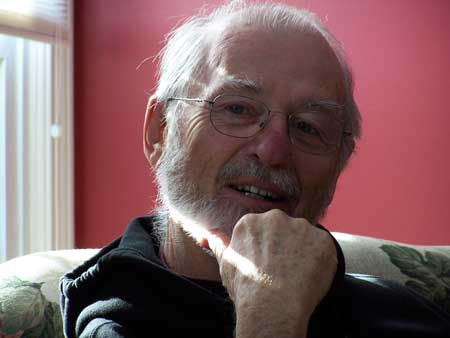Paul Shanley
“The notion that traumatic events can be repressed and later recovered is the most pernicious bit of folklore ever to infect psychology and psychiatry.It has provided the theoretical basis for ‘recovered memory therapy’ — the worst catastrophe to befall the mental health field since the lobotomy era. ” (Click here for full letter.)
Professor Richard McNally
Director of Clinical Training, Department of Psychology,
Harvard University
Author of Remembering Trauma
The NCRJ Press Release

FOR IMMEDIATE RELEASE
June 20, 2005
* * *
The National Center for Reason and Justice (NCRJ), a non-profit legal and advocacy group for falsely accused and wrongfully-convicted victims of sexual-abuse hysteria, today announced that it will provide financial and other support to the legal appeal of defrocked priest Paul Shanley. Shanley, a former parish priest at St. Jean l’Évangéliste Church in Newton, Massachusetts, is currently serving a 12-15 year sentence for the rape and assault of a Sunday school student at St. Jean’s in the 1980s. The NCRJ hopes that its support will shed light on the unjust circumstances of Father Shanley’s trial, as well as the considerable doubt surrounding the scientific validity of “massively repressed memory” theory, which was used to explain his accuser’s belated claims. In calling for an unbiased and calm review of Shanley’s trial and conviction, NCRJ joins a growing chorus of critics – on both the political right and the left – who are deeply troubled by the realization that Shanley’s right to a fair trial was tainted by sensational, incomplete and biased media coverage.
Shanley, 74, became one of the highest-profile figures in the Catholic abuse scandal that gripped the state in 2002. But while Shanley’s conviction in February was widely interpreted as a closing chapter in the scandal, his case bears classic warning signs of a wrongful conviction. In particular, NCRJ is alarmed that no witnesses could corroborate details central to the claims of Shanley’s four original accusers, and that all four of those accusers claimed to have “repressed” their memories of being repeatedly raped, only to have the memories “flood back” years later when they read news reports of the clergy sex scandal. Three of the four accusers were dropped by the prosecution before the case went to trial. The sole accuser whose case proceeded, and who testified, was Paul Busa. His name was not revealed in most media accounts, although Busa had given numerous interviews to the press and had posed for media cameras at the time he first made the allegations in 2002.
“Massive repression” is a notion postulated by a popular but scientifically discredited theory that holds that the mind protects itself by blocking off repeated horrific events for many years – behind what some therapists call a “dissociative barrier” – until the barrier somehow starts to crumble and the memories return, often in a rush. (Some therapists believe they can help patients “recover memories” that have been thus repressed.) Sixty years of research on documented trauma victims reveal no convincing evidence that trauma survivors find it difficult to remember their most terrifying events, especially when the trauma has been repeated many times. It is possible not to think about an event, even a traumatic event, for many years. But intense emotional events, especially repeated ones, are usually quite memorable. The problem for most people who have lived through trauma is not that they can’t remember, but that they can’t forget.
The theory of massively repressed memory has been rejected by most criminal courts, and the psychological harm that “recovered memory” therapy inflicts has been repeatedly documented. False memories of sexual abuse – which are sincerely believed by the individual – have been induced in adults and even more infamously in the children who were led to make false accusations of ritualistic sexual abuse against day-care workers in the 1980s and early 90s. (In the past decade, many of those convictions have been overturned.) Today, the majority of board-certified psychiatrists reject the theory of massive repression as “junk science” and point to persuasive evidence that “recovered-memory” therapy has a tendency to induce false recollections.
Key rulings have occurred in other states – such as the Hungerford decision (New Hampshire, 1997), which recently withstood a legal challenge. Unfortunately, the Massachusetts Supreme Judicial Court has been out-of-step with other courts throughout the country in recognizing the pernicious impact of various bogus practices – including biased and suggestive interviewing techniques – in obtaining convictions in a variety of these sex-abuse cases. The NCRJ hopes to break that cycle with a number of cases it is currently sponsoring, including, now, the Paul Shanley case.
The hysteria surrounding Shanley’s trial overshadowed the discussion of the science surrounding the accusations. It is in such an atmosphere that the chances of obtaining a wrongful conviction are highest. Those commentators across the ideological spectrum who bothered to take a close look at the evidence rightfully concluded that Shanley received an unfair trial. Publications as diverse as Forbes (Daniel Lyons), the Duluth News Tribune and The Boston Herald (Robin Washington), and Legal Affairs (JoAnn Wypijewski) published exposes of the twisted history of the Shanley trial, cast doubt on the strength of the case against him, and lamented the failure of justice. Others who have harshly criticized the trial include Alexander Cockburn (The Nation and CounterPunch), Michael Miner (Chicago Reader), and Jonathan Rauch (National Journal).
The National Center for Reason and Justice, founded in 2002, seeks to educate the public about sexual abuse-related injustices and to provide financial and legal assistance to the falsely accused and wrongfully convicted. NCRJ is a tax-exempt organization under Section 501(c)(3) of the Internal Revenue Code. Its website is www.ncrj.org.
